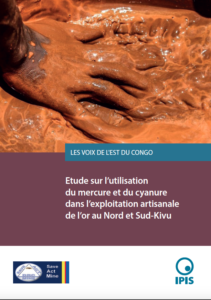From 24 to 29 September 2017 the first meeting of the Conference of the Parties to the Minamata Convention on Mercury will take place in Geneva, Switzerland. The Convention was approved by delegates from over 140 countries in 2013, and entered into force in August 2017. It is a multilateral environmental agreement addressing specific human activities which are contributing to widespread mercury pollution. Implementation of this agreement will help make an end to the severe and acute threats mercury poses to the environment and human health.
Artisanal and small-scale gold mining (ASGM) has been identified as the world’s single largest source of anthropogenic mercury emissions. Miners and traders often mix mercury with gold to form alloys called amalgams. When these amalgams are subsequently heated the mercury evaporates, leaving the gold behind. This procedure is so widespread in ASGM because of its ease, affordability, availability, lack of risk awareness, and the absence of any affordable alternatives.
The Minamata Convention will require party nations to reduce and where feasible eliminate the harmful use and release of mercury from ASGM. It includes a ban on new mercury mines, the phasing-out of existing ones, interim storage of mercury, disposal of contaminated waste, identification and management of contaminated sites, and health issues.
Save Act Mine (SAM), a local NGO in eastern DRC, has done grass roots analysis of the use of mercury and cyanide in artisanal gold mining in eastern DRC. In its publication “Etude sur l’utilisation du mercure et du cyanure dans l’exploitation artisanale de l’or au Nord et Sud-Kivu”, Save Act Mine has documented the toxic effects of mercury and cyanide in ASGM and calls on all actors involved – authorities, international institutions, companies, CSO’s – to take responsibility for responsible and sustainable mining. IPIS has published this report in its series “Voices from eastern DRC/Les voix de l’Est du Congo”. With the ‘Voices from Eastern DRC’ project, IPIS aims at launching a series of publications from local partners in order to bring their work to a larger audience.
Act Mine (SAM), a local NGO in eastern DRC, has done grass roots analysis of the use of mercury and cyanide in artisanal gold mining in eastern DRC. In its publication “Etude sur l’utilisation du mercure et du cyanure dans l’exploitation artisanale de l’or au Nord et Sud-Kivu”, Save Act Mine has documented the toxic effects of mercury and cyanide in ASGM and calls on all actors involved – authorities, international institutions, companies, CSO’s – to take responsibility for responsible and sustainable mining. IPIS has published this report in its series “Voices from eastern DRC/Les voix de l’Est du Congo”. With the ‘Voices from Eastern DRC’ project, IPIS aims at launching a series of publications from local partners in order to bring their work to a larger audience.
As part of its ongoing work of mapping artisanal mines in countries like DRC and Tanzania, IPIS is currently developing its methodologies to better monitor the use and impact of mercury. It believes that publishing better and more detailed information will help to tackle and eventually end the widespread mercury poisoning from artisanal gold mining. IPIS will publish the results of these monitoring endeavours in the course of 2018 on its website.

